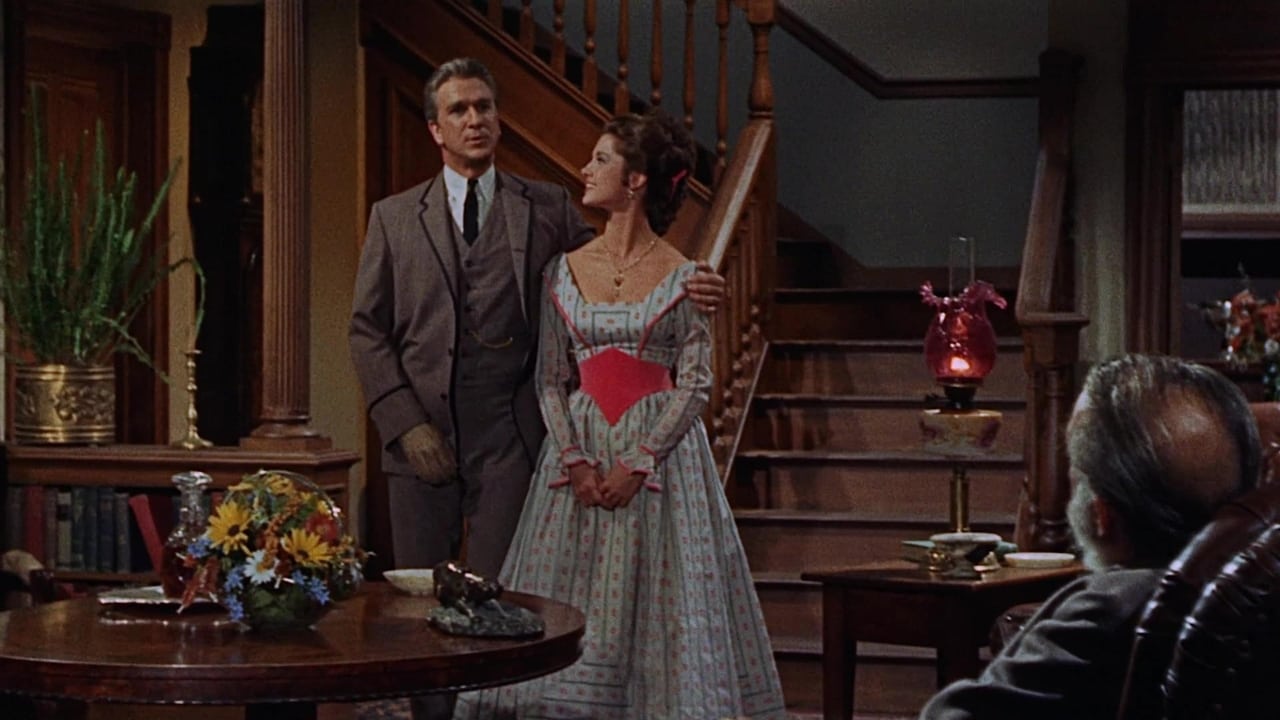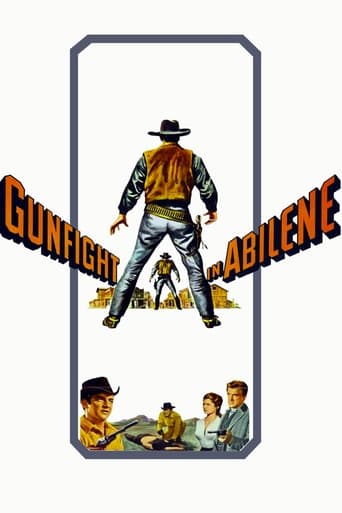

Some celebrities weren't born to be leading men. Handsome but slight of stature Bobby Darin is a prime example. The "Splish Splash" songwriter and singer is miscast as a resourceful but tortured sheriff in William Hale's lackluster Universal Picture's western "Gunfight in Abilene" with Leslie Nielsen. Mind you, Darin had proved he could act. After all, he received an Academy Award nomination for Best Supporting Actor for his performance in the Gregory Peck movie "Captain Newman, M.D." Meantime, this thoroughly predictable law & order oater about the usual tension simmering between pugnacious cattlemen and resentful sodbusters is nothing more than an uninspired remake of director Charles F. Haas' "Showdown in Abilene" (1956) that top billed a far more formidable Jock Mahoney. Comparatively, in an early scene when the hero intervenes in the action from hotel balcony, Darin wears his shirt open partially, while Mahoney displays his naked muscular torso. Interestingly enough, producer Howard Christie bankrolled the original sagebrusher, and he doesn't deprive this dreary horse opera of anything that a polished western requires. The streets teem with lots of extras, and the stores appear less generic than either might in the typical B-movie oater. The stock footage of cattle in long shots doesn't look like stock footage used one time too many. In other words, like its star, "Gunfight in Abilene" is a handsome looking western.An immaculate, silver-tongued, Leslie Nielsen plays the chief villain, but he is no match for Lyle Bettger in the original "Abilene. He differs from Bettger because he sports a wooden hand rather than a stump. Nevertheless, Nielsen isn't a helpless cripple who solicits sympathy. He uses his wealth to keep Abilene under his thumb. Nielsen is an urbane, well-dressed, cattleman and his hooligans ride the range roughshod over the passive farmers. These were the days, we're told, when you could shoot trespassers on sight because you were within your legal rights. The farmers are struggling to cast off Evers' dominance, but they lack the courage. Darin is former Confederate officer Cal Wayne. During the American Civil War prologue, Darin makes a convincing officer, but he doesn't retain a shred of believability when he arrives in Abilene. As it turns out, Wayne accidentally shot and killed Nielsen's younger brother during a chaotic battle. Impulse more than caution prompted Cal to gun down his friend before he recognized that he wasn't the enemy. Our mentally castrated hero experiences so much guilt for killing his friend that he shuns guns. Captured while struggling to get his friend to a hospital, Wayne wound up languishing for the remainder of the war in a Union prisoner-of-war camp. After the South surrenders, Wayne rides back to Abilene to find Grant Evers (Leslie Nielson of "Airplane!") making life unbearable for the farmers. For example, in an early scene, Evers' men tear down a barbed wire fence, and its owner gets entangled in the wire as it coils around him. Evers's men then stampeded their steers through the farmer's property, and the cattle trampled the crops. Later, a young farmer, Cord Decker (Michael Sarrazin of "Sometimes A Great Notion"), comes home from the war to his wife. Unlike Cal, Decker served in the Union Army. Unfortunately, he incurs the wrath of Evers' right-hand henchman Slate when he suggests Cal is better qualified to be the town sheriff. It is only a matter of time until the wicked Slate (Donnelly Rhodes of "Touched by a Killer") crosses paths with Decker and bullwhips him. This scene is probably the most violent. This is all the timid farmers need to unit them and rise up against Evers. Slade hates the way that his boss Evers has given into the farmers. First, Evers convinced Slade to relinquish his badge; Slade had bullied the farmers as Evers' bought and paid for gunman. Second, Evers showed weakness when he gave into the farmer's initial claims for his steers devastating crops. After this moment of reconciliation with the farmers, Evers persuaded his old friend Cal to pin on the sheriff's badge. It seems that Cal was responsible for Evers' missing hand. Predictably, Cal posts an ordinance that firearms are forbidden now inside the city limits, and he has to beat up one of Evers' unruly ruffians to prove that he can still defend himself.Of course, there is the question of the woman, Amy Martin (Emily Banks) who promised herself to Cal. Everybody, including Amy, believed Cal had died during the war. She has since agreed to marry Grant Evers. When Cal shows up in Abilene, Amy regrets her decision. Slowly, the wedge between Cal and Evers deepens, but it is the evil Slate who precipitates the bloodshed when he whips Cord to death. At the same time, a gulf of discontent has been widening between Slade and his boss. Slade kills Evers after Evers tries to pay him off and send him packing. It is always a dramatic mistake to let the second-string villain kill the first-string bad guy. Inevitably, Cal musters the strength of mind to buckle on a pistol belt. Similarly, sticking to the western formula, Slade must have the first shot before our hero can vanquish him. "Journey to Shiloh" director William Hale qualifies as a thoroughly conventional craftsman until the inevitable showdown between Slade and Cal. At this point, Hale relies on Dutch tilt camera angles to depict the gunplay. Make no mistake, the gunfight looks good, but it isn't high drama. This may qualify as Donnelly Rhodes' best performance; he is a villain you love to hate. . Anybody who doesn't know that Leslie Nielson used to play straight roles instead of specialize in comedy may be alarmed at his villainous turn as Darin's adversary. Altogether, "Gunfight in Abilene" is a tolerable western, but "Showdown in Abilene" completely overshadows it in virtually every respect.
... View MoreA lot of 1960s B westerns turned out to be remakes of 1950s B films - especially those starring Audie Murphy - and this is no exception. Its a remake of Showdown in Abilene starring Jock Mahoney. This is so close to the original that the original writer of Showdown, Berne Giler, gets a 'screenplay' credit although I suspect that means Giler's original script was handed to the other credited writer, John Black, who made a few nominal changes to update it for the budget and to try and disguise that this was a remake by changing the character names.Looking suspiciously as if it was intended originally as a Murphy vehicle, this humdrum affair features singer Bobby Darin as a gunfighter who can't put on a gun again after accidentally killing his best friend but naturally is forced to do so at the end. Darin struggles in the acting stakes - someone must have told him to wear black gloves as a symbol of being psychologically disturbed (maybe he saw Kirk Douglas in The Last Sunset - of which more later) although no-one comments on this even when he wears them indoors - and bites his lips a lot. He's also too slight to be a feared gunman and looks faintly ridiculous in nicely pressed tight beige trousers.The background plot is a range war between cattlemen and sodbusters. However, being that this is a cheap film, all of the shots of cattle herds and civil war fighting are taken from other films shot on different film stock and it shows. This being a Universal release the production has been allowed to raid the Universal library and che civil war shots are from Shenandoah and many, if not all of the shots of cattle herds are from aforementioned The Last Sunset including shots of a cattle herd crossing a river into a town and being put into a cattle corral. So, instead of seeing any cattle everything is largely confined to the standing Universal western town set and a few indoor sets.The film is lamentable short on much action until the end. Further Darin's character came across to me as a complete cad. Darin's chopped off Leslie Neilson's arm, killed his brother and then tomcatted his fiancée(whom Darin also humiliates by being blatantly unfaithful too by screwing another woman virtually infront of her and then dumping this other gal when the ex-financee changes her mind). Neilsen should have shot Darin dead.I thought Don Galloway came off best as the laid back deputy quite happy to serve any sheriff, no matter how corrupt.
... View MoreOne of the hardest tests for an actor who is famous in other genres, like musicals is to make a western and come out well. So many tried and did not make it. Bobby Darin' performance in this film is quite an achievement. Darin himself was responsible for the musical soundtrack, which is excellent, specially the song "Amy". We have seen countless times the story of a man who goes to war and when he comes back sees his woman engaged to somebody else. Here we have the same story, but done with special care, due to the script and the fine acting of Emily Banks. The scenes where there is action are well made, you even see Darin kicking with his feet. He also wears his gun with the handle turned the other way around. The story is too predictable, but it has one uncommon element, which is the guilt feelings that dominate Darin making him behave in a strange way in relation to people that know him well. The director, William Hale was very well known for his work on television, and after the undeservedly bad reviews this film got, went back to it.
... View MoreAlthough this is routine faire, it is interesting to watch Darin and Neilson in a western with an early performance by Michael Sarrazin. The title song "Amy" is nifty, worked into the background music nicely and doesn't wear out it's welcome, as in the case of so many other westerns. The plot is routine, but the action moves the story along to it's predictable conclusion nicely, giving us a good watch.
... View More